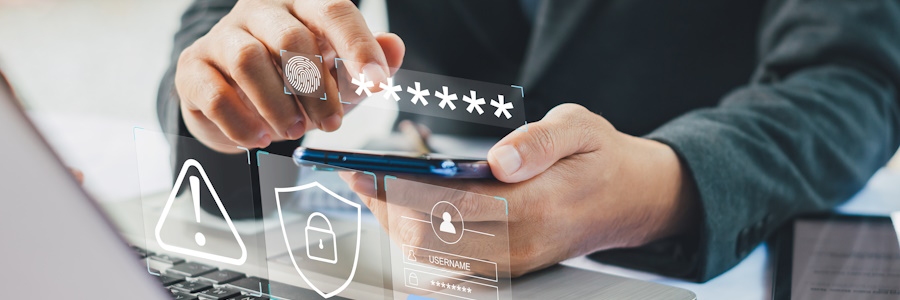In today’s digital world, email is the backbone of communication for businesses. Whether you’re discussing sensitive financial information, coordinating with clients, or sharing internal strategies, email is a critical tool. However, this reliance on email also makes it a prime target for cybercriminals. When hackers gain access to an email account, the consequences can be devastating, ranging from financial fraud to severe breaches of sensitive data. In this article, we’ll explore how email accounts are compromised, the risks this poses to business owners and executives, and why securing your accounts with Multi-Factor Authentication (MFA) is essential.
Understanding the Threat: How Email Accounts Are Compromised
Email accounts are often the gateway to a treasure trove of sensitive information, and hackers have developed numerous methods to breach them:
- Phishing Attacks: Hackers often send deceptive emails that appear to be from legitimate sources. These emails contain malicious links or attachments designed to trick users into providing their login credentials or downloading malware. Once compromised, hackers gain full access to the victim’s email and any linked accounts.
- Brute Force Attacks: Using automated tools, hackers can guess an email account’s password by trying countless combinations. Accounts with weak or commonly used passwords are especially vulnerable to this method.
- Credential Stuffing: Cybercriminals use stolen credentials from previous data breaches to try and access other accounts. Since many people reuse passwords, a breach in one account can lead to compromises across multiple platforms.
- Social Engineering: Hackers may impersonate trusted individuals or organizations to manipulate victims into revealing their email credentials. This method exploits the trust inherent in professional relationships.
- Malware: By installing malicious software on a victim’s device, hackers can capture keystrokes, steal passwords, or even take control of the email account directly.
The Consequences: How Compromised Emails Are Used for Theft
Once hackers gain control of an email account, they can use it to execute various forms of online theft:
- Financial Fraud: Hackers often use compromised emails to send fake invoices or payment instructions, redirecting funds to their accounts. This type of fraud can go unnoticed until it’s too late to recover the money.
- Identity Theft: With access to personal and financial details stored in emails, hackers can steal the victim’s identity, apply for credit, or commit other forms of fraud.
- Business Email Compromise (BEC): In BEC scams, hackers impersonate executives or trusted employees to deceive others into transferring funds or sharing sensitive information, often leading to significant financial losses.
- Data Breaches: Hackers can access and exfiltrate confidential business data, such as client information or trade secrets, which can then be sold on the dark web or used for blackmail.
- Spreading Malware: A compromised email account can be used to send phishing emails to the victim’s contacts, potentially infecting other systems and spreading the attack further.
The Common Misconception: "I'm Not a Target"
A dangerous myth persists among many business owners and executives: the belief that “I’m not important enough to be targeted by hackers.” This misconception leads to complacency and a lack of robust security measures. In reality, cybercriminals often target small to mid-sized businesses precisely because they assume these organizations have weaker defenses.
According to the 2023 Data Breach Investigations Report by Verizon, small businesses are the target in 43% of all cyberattacks. The assumption that only large corporations are at risk is not only incorrect but also dangerous. The financial and reputational damage caused by a single email compromise can be catastrophic, regardless of the size of the business.
The Power of MFA: A Simple Yet Effective Solution
One of the most effective ways to protect your email accounts is by implementing Multi-Factor Authentication (MFA). Unlike single-factor authentication, which relies solely on a password, MFA requires an additional verification step, such as a text message code, biometric scan, or an authentication app.
Statistics highlight just how effective MFA can be. According to Microsoft, accounts protected by MFA are 99.9% less likely to be compromised. Similarly, Google reports that using MFA can prevent 100% of automated bot attacks, 96% of bulk phishing attacks, and 76% of targeted attacks. These figures underscore that MFA is not just a recommended security measure; it’s a necessity.
Real-World Examples: The Cost of Inaction
The consequences of neglecting email security are not just theoretical—they’re happening every day. Consider the case of a small Nebraska company that lost nearly $200,000 due to a business email compromise (BEC) scam. Hackers gained access to the company’s email system and used it to send fraudulent payment instructions to a client. By the time the fraud was discovered, it was too late to recover the funds.
In another case, a real estate firm in Texas fell victim to a sophisticated attack where hackers monitored their email communications for weeks. Just before closing a significant property deal, the hackers sent an email with fraudulent wire transfer instructions to the buyer, resulting in a loss of nearly $500,000. These incidents, reported by the FBI and CNBC, respectively, illustrate the severe financial and operational consequences of email compromises.
Overcoming the Inconvenience of MFA
Some business owners and executives resist implementing MFA because they perceive it as inconvenient. However, when weighed against the potential losses from an email hack, the minor inconvenience of MFA is a small price to pay for security.
Modern MFA solutions are increasingly user-friendly, with options like biometric authentication or one-tap approvals making the process quick and easy. The peace of mind that comes with knowing your accounts are secure far outweighs any slight inconvenience.
Taking Action: Protect Your Business Today
As a business executive, the responsibility for safeguarding your company’s assets, reputation, and future rests on your shoulders. The belief that “I’m not a target” is a dangerous fallacy that can leave your business vulnerable to devastating attacks. Implementing Multi-Factor Authentication is a powerful step you can take today to protect your email accounts and secure your business against online theft.
In an increasingly digital world, vigilance is key. By adopting MFA and educating your team about the risks of email compromise, you can significantly reduce the likelihood of falling victim to a cyberattack. Don’t wait until it’s too late—take action now to protect what you’ve worked so hard to build.
The threat is real, but with the right precautions, your business can stay safe in the face of an ever-evolving cyber landscape.


